Sentir Bolivariano
Adán Chávez Frías
@adancoromoto
Nuevo Triunfo de la Política Exterior Bolivariana
Las venezolanas y los venezolanos somos hoy protagonistas de un hecho histórico crucial, que denota el avance alcanzado por los Pueblos en la construcción de ese mundo multicéntrico y pluripolar, posible y necesario, en el que tanto insistió el Comandante Hugo Chávez, con la palabra y con la acción.
Como sabemos, desde que el líder histórico de la Revolución Bolivariana asumió la Presidencia de la República por vez primera, por mandato de la mayoría del Pueblo venezolano; puso en marchacomo uno de los objetivos estratégicos de su Plan de Gobierno, una política internacional de nuevo tipo, autónoma y fundamentada en los principios de la unidad continental y mundial entre los Pueblos, en la cooperación y la solidaridad entre éstos en la lucha por su emancipación, en la no intervención en los asuntos internos de otros países y en el respeto a la sagrada soberanía nacional; principios estos que quedaron plasmados tanto en la Constitución Bolivariana como en el Plan de la Patria, que forman parte fundamental del legado de nuestro Comandante Eterno.
II
Chávez, a diferencia de la subordinación de los gobiernos precedentes a los designios del norte, inmediatamente abrió el abanico, fortaleciendo los lazos de amistad y cooperación con los países de Nuestra América Latinocaribeña, y con otros Pueblos hermanos; priorizando la cooperación Sur-Sur.
Ello, supuso el establecimiento de importantísimos convenios de cooperación con China, Rusia, Bielorusia, Turquía, Argelia, Irán, Sudáfrica y Cuba, entre otros países; convenios que expresan la configuración del mundo nuevoantes referido, contrapuesto a los intentoshegemónicos del imperio norteamericano y sus aliados.
Venezuela se unió, entonces, a los esfuerzos de largo aliento por concretar ese mundo soñado por la mayoría de los Pueblos, que haría posible en palabras del padre cantor Alí Primera, “más humana la humanidad”; un camino que no está excento de obstáculos, ya que es permanentemente torpedeado por las oligarquías globales, bajo la dirección del establishment norteamericano.
La materialización de estos convenios es, además, la demostración de que Venezuela no está sola, algo que ha quedado claro ante los reiterados esfuerzos del imperialismo, cada vez con mayor saña, por tratar de frenar nuestra Revolución Chavista y Bolivariana; momentos en los que el país ha recibido incontables e inquebrantables muestras de solidaridad y apoyo por parte de diferentes Pueblos y gobiernos del planeta.
III
En la actual coyuntura que atraviesa la humanidad, en la que el imperialismo agudiza elferreo bloqueo económico, financiero y comercialimpuesto al Pueblo venezolano, que impacta negativamente en su cotidianidad y, de manera particular, en el funcionamiento de la industria petrolera nacional; resulta invalorable el apoyo que nos brinda el gobierno iraní, que hoy se expresa en la llegada de aproximadamente 127 millones de litros de gasolina, diferentes catalizadores e insumos para la refinación en el país, y algunos repuestos para el mantenimiento de nuestras refinerías; una acción valiente, legítima y soberana que tiene lugar a pesar de las amenazas imperiales.
De manera que, con la llegada de estos cinco buques iraníes, no solamente se derrotan, una vez más, las pretensiones hegemónicas del decadente imperio yanqui; sino que además estamos en presencia de un hito trascendentalen nuestra historia contemporánea, como el 4F de 1992 y el 13 de abril de 2002; un hecho que quedará sembrado en el imaginario de las venezolanas y los venezolanas y, en general, de los Pueblos del mundo que luchamos por nuestra emancipación.
El quiebre histórico que se da entre el antes y el después de la llegada de los buques iraníes a costas venezolanas, ejemplifica los nuevos tiempos que estamos viviendo, los cuales demandan que nuestros Pueblos, dispuestos a defender su soberanía e independencia, fortalezcan sus lazos de cooperación y solidaridad para beneficio de la humanidad, y de la seguridad y la paz global; un esfuerzo que,como lo señalara el Comandante Chávez al referirse al IV Objetivo Histórico del Plan de la Patria, “…nos lleva a seguir contribuyendo en la conformación de un mundo multicéntrico y pluripolar, para echar abajo definitivamente el proyecto unipolar del imperialismo, que pretende acabar con este planeta. Necesitamos el equilibrio del universo para decirlo con Bolívar, … y para ello es muy importante que … Venezuela siga … jugando el papel en la nueva geopolítica internacional en la que hemos contribuido en algo …, … es el mundo policéntrico y pluripolar el que nosotros … tenemos que continuar contribuyendo a formar”.

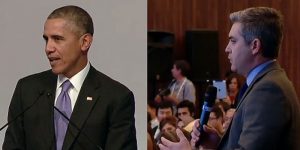
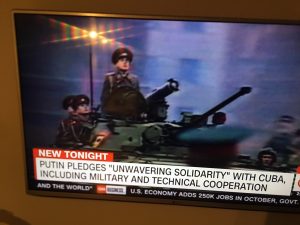
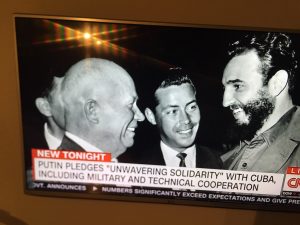
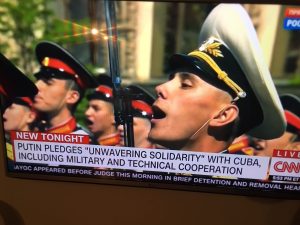
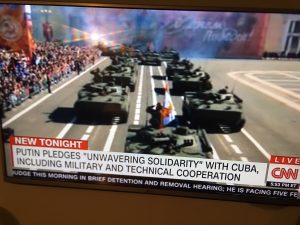
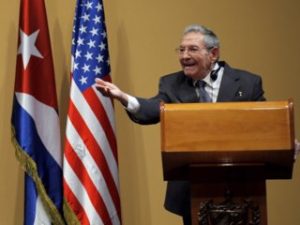
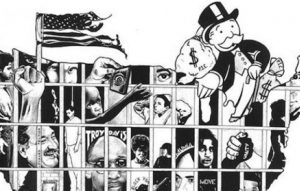
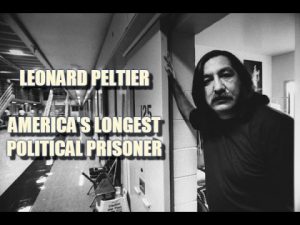
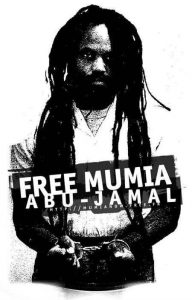
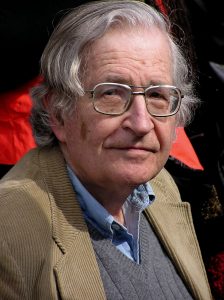
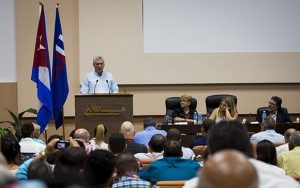
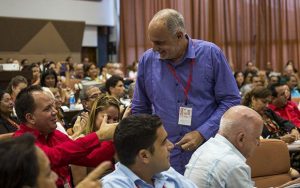
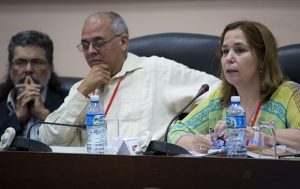
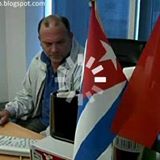
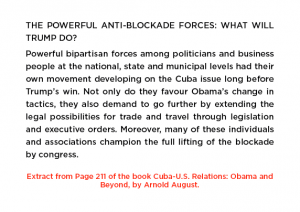
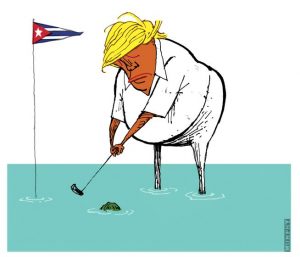
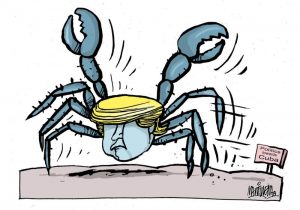
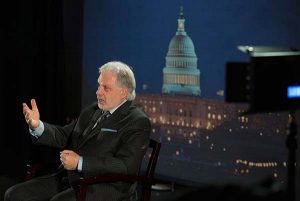
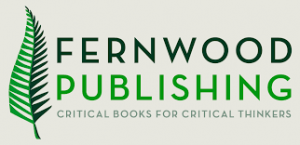



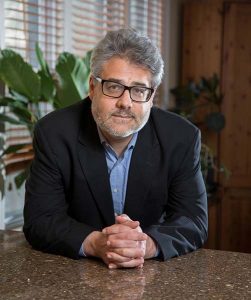
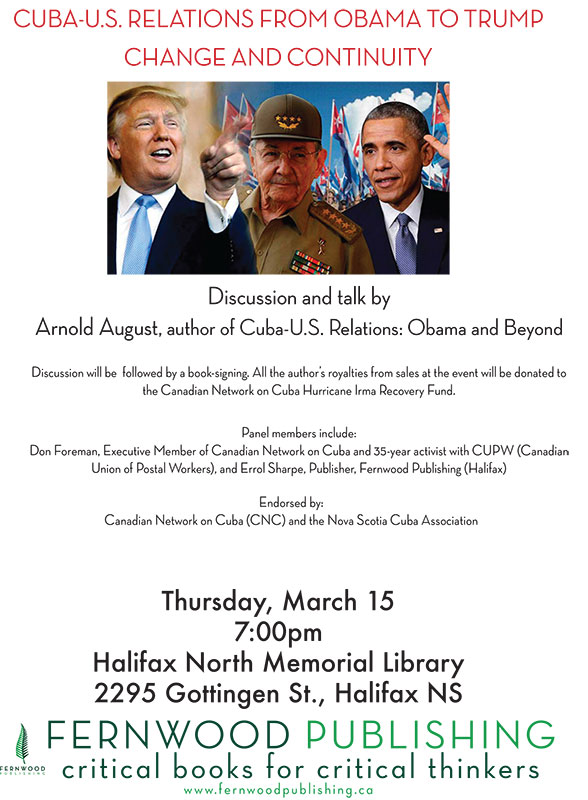
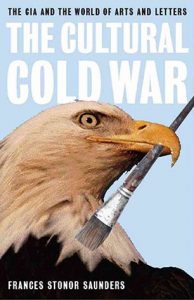
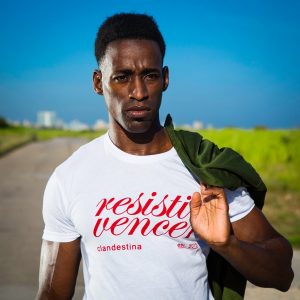
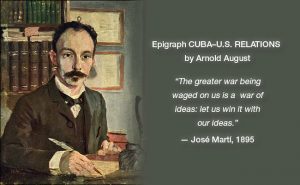 This example, among many others, confirms the well-documented thesis regarding the war on ideas (or cultural war) in my book CUBA–U.S. RELATIONS. This T-shirt business and its owner were explicitly promoted by Obama during his March 2016 visit to Havana. The owners graduated from the Columbia Business School’s Entrepreneurship and Competitiveness in Latin America Program.
This example, among many others, confirms the well-documented thesis regarding the war on ideas (or cultural war) in my book CUBA–U.S. RELATIONS. This T-shirt business and its owner were explicitly promoted by Obama during his March 2016 visit to Havana. The owners graduated from the Columbia Business School’s Entrepreneurship and Competitiveness in Latin America Program.